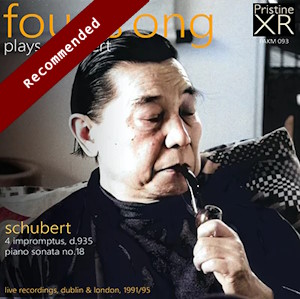
Franz Schubert (1797–1828)
Impromptus, D. 935
Piano Sonata in G major “Fantasie”, D. 894
Fou Ts’ong (piano)
rec. 1991/95, Dublin, Ireland & London
Pristine Audio PAKM093 [69]
With all due respect to Sviatoslav Richter and the late Maurizio Pollini, Schubert is Schubert, not Beethoven or Brahms. Fou Ts’ong, whose recordings of Chopin’s music have long delighted collectors, understood this obvious, but often overlooked truth. On this Pristine release, which contains portions from concerts recorded in the 1990s, he shows himself to be an exceptionally sympathetic Schubertian.
Fou’s masterly grasp of Schubert’s balancing act between gracefulness and vulnerability is immediately heard in the set of Impromptus, D. 935, that head this release. His feathery touch and airy layering impart a transparency to the introductory measures of the “Allegro moderato” that is rightfully Mozartian, setting up a performance where light is kept in proportion with the shadows that certain other pianists allow to overwhelm in this music. Likewise in the succeeding “Allegretto” and set of “Rosamunde” variations, Fou banishes the dourness typically heard in favor of an easy-going gait that makes the fragility of these pieces all the more affecting. The ornamentation and giggling scalar runs in the latter’s respective second and fifth variations pop with delightful effervescence that bubbles over into the final “Allegro scherzando”, whose home key of F minor unfortunately invites far too many pianists to indulge in histrionic antics. Puckish charm is the keynote of Fou’s performance, which is met with well-earned applause.
Equally treasurable is Fou’s performance of the Piano Sonata in G major, D. 894. Youthful and sunny, his interpretation has nothing of the funeral dirge that has latterly been fashioned inexplicably from the opening movement, one of Schubert’s happiest creations. Life, one gets the impression from other pianists, is a joyless thing experienced entirely under the oppression of suffering and eventual death. Fou presents to the listener not a musical “Abschied”, but a song of gratitude. He reminds the listener that Schubert, ill as he was, was a young man; moreover, one who despite everything faced his destiny not with morbidity, but with a manliness that accepted life’s blisses and sorrows. If the pain from the latter should occasionally make us cry out, he seems to suggest, it ought to make us appreciate all the more so those moments when the former reign.
The sound is better in the Impromptus than in the sonata, but the piano is nestled comfortably, not buried, within the hall ambience in both recordings. Andrew Rose said in the Pristine newsletter announcing this release that he deliberated whether or not to also include recordings made in 1997 of the Moments musicaux and Piano Sonata in A major, D. 959. He ultimately declined on account of the print-through that afflicts the original tapes. I hope he reconsiders. Fou’s Schubert, tape flaws and all, is simply too valuable to sequester from listeners who would surely consider it a small price to pay for playing of such transcendent beauty.
Néstor Castiglione
Availability: Pristine Classical


















